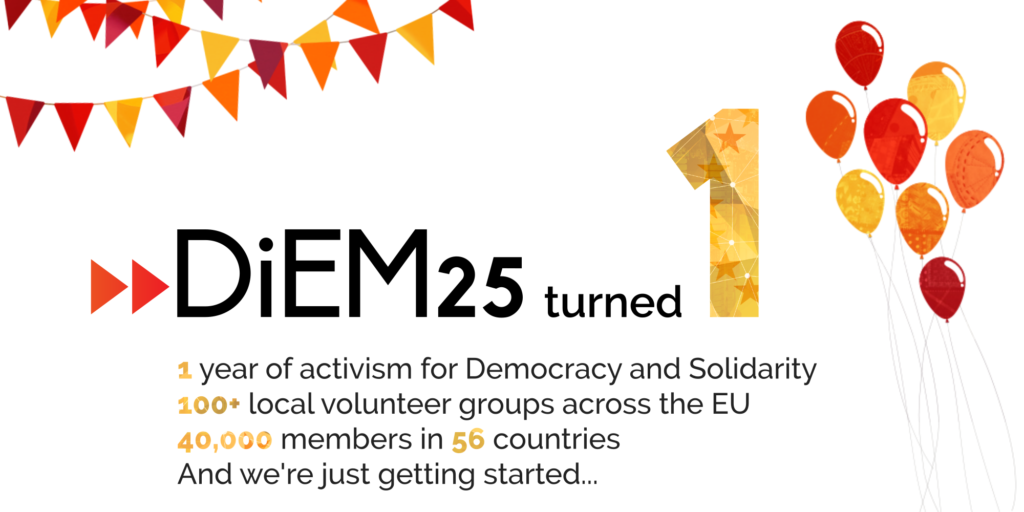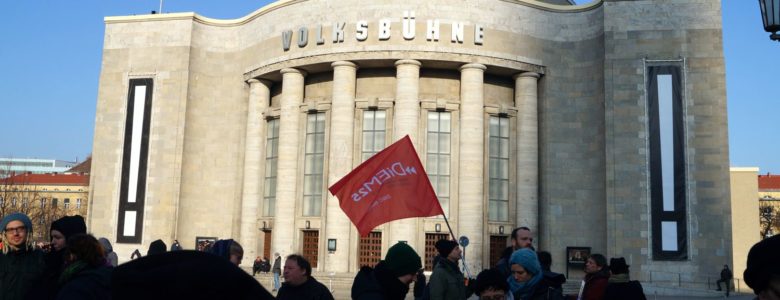
DiEM25: One Year On
In February 2016, we launched our movement with a simple goal: to democratise Europe. Back then, the establishment media quickly dismissed us as ‘too radical’ and ‘utopian’, and went back to the business of preserving the status quo for their corporate and political masters.
Well, a year on, our journey to ‘radical utopia’ is going quite well! We now have nearly 40,000 members in 56 countries, crossed swords with the Establishment with campaigns on migration and transparency, assembled a pack of progressive leaders like Noam Chomsky, Elif Şafak and Brian Eno to help guide our movement, and developed an economic agenda to save Europe in a pioneering grassroots democratic process that gives every single member a say.
And we’re just getting started…
Here’s a detailed look at what we’ve done over the past year.
Happy birthday DiEMers!
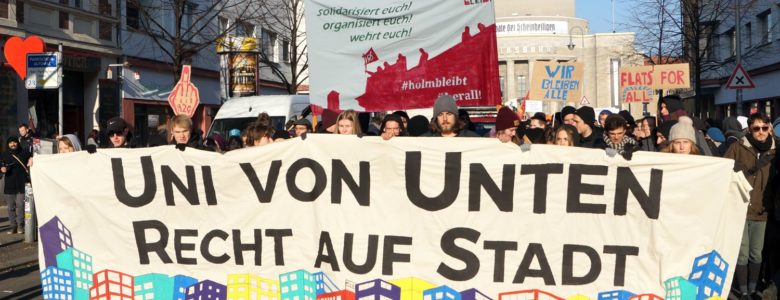
Change from below – City for everybody
In Berlin a broad alliance of local initiatives takes to the streets for social housing and self-determined organisation of the city by its inhabitants. Students of the Humboldt University of Berlin initiated this demonstration. What is exemplified by this demonstration is the consequence of extensive social change. A report.
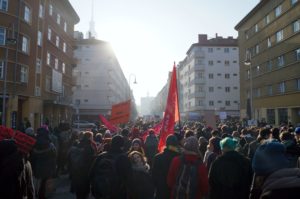
The students present at the demonstration on Saturday did not exhibit signs of fatigue. Although they would have had every reason to be tired. For ten days already they have occupied the Institute of Social Sciences of Humboldt University. The catalyst for the lasting occupation has been the dismissal of their lecturer for City Sociology, Andrej Holm. Holm, who additionally saw himself forced to step back from his office as State Housing Secretary for the Berlin government, a coalition of the social democratic party (SPD), the Green and Left Parties (Die Grünen, Die Linke), a few days earlier, is known for his critical investigation into the development of city politics such as gentrification and the sell-out of the city.
„Andrej was our voice“, says a man of the Mieterprotest in Pankow during the students‘ plenary. The room in the Humboldt University’s Institute of Social Sciences is packed. According to the speaker, Holm had been the one listening to the Tenant’s Protest and had carried on their concerns and wishes.
The indignation about his dismissal is more than clear. Many statements like this are made. The students had invited local initiatives concerned with city politics and developments in their respective districts on that Friday. One could observe how numerous they were. “Kotti & Co”, “Tenants of the Otto-Suhr-Siedlung”, “Stadt von Unten”, “100% Tempelhofer Feld”. They are all united in their anger at Berlin city politics.
It becomes clear how this is about more than the Holm case. The political atmosphere is tense. It seems, as if many had waited for the opportunity, to voice their anger. “Presence and political Resistance” would not take place enough, commented Max, a student of Humboldt University, who for days has spent his nights at the institute. He feels “general dissatisfaction”, that now finally has found space to express itself through the occupation. But where does this dissatisfaction stem from?
Everywhere in German cities the rent level has risen over the last years. Even rooms in student dorms start at 400 Euros. Discrepancies of the economic development can be felt directly. While tax income flourishes as the state is reduced in size and companies and international financial capital reap unimaginable profits, academics but also craftsmen slip into financially precarious situations.
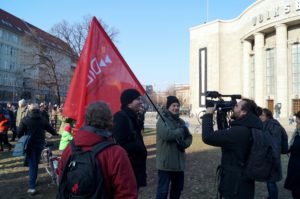
To blame is the often mentioned widening gap between the rich and the poor. It is macro structures like institutions, states and organisations with gigantic revenue on the one hand, and the many individuals on the other; “those above and us down here”. It is abstract.
Recently, Die Zeit dedicated an entire dossier to this trend. Democracy is in danger, was their message. “Earlier the German Parliament had many members that only [sic!] went through primary or secondary education. They were fabricants of tools, craftsmen, simple people.” Today this is not the case anymore, which is why increasingly these groups do no longer feel themselves represented. It is only logical that a political vacuum forms. Those most accountable for this development are the political parties. Who asks around about the upcoming federal parliamentary elections often encounters a general disorientation.
Party expenses for professional communications consultancy have multiplied over the last years. Any rigid distinction by content becomes increasingly difficult. Parties themselves have become parties of professional voters. True to the teachings of the market economy parties look for voters, like companies search for their clients. The alignment of political parties with topics that promise the biggest share of voters leads to the disregard of parts of society. Or, in the words of sociologist Didier Eribon, the neglect of entire social classes.
What our world is living at the moment is that this vacuum of representation is filled by parties and individuals, who preach a bizarre and one-dimensional world view. AfD, Front National, Geert Wilders, Donald Trump. It seems almost ironic that it is this year that Germany, France and the Netherlands hold federal elections. In those countries, in which unidimensional populists from the right have found their way into the middle of society. Their victory is a victory of “Irrationality” as an editor recently called it. The true meanings of “postfactual” or “Fake News” are visualized brightly and vividly this way.
The grave changes in the structure of society, the transition from industrial to service societies, urbanization and migration, they all pose a new social question, one that should be read focusing on city politics, as city councillor for housing in Berlin, Ephraim Gothe, contends. And the market will surely not solve it. For this reason alone, Gothe wants to convert city politics in a “real leftist project”, as the Tagesspiegel wrote. The Holm case spreads major distrust in this context. Actually, there is no reason to think about city politics without thinking of financial politics. And finance and speculation are running wild, as can be seen. Selling is fast, to take something into communal ownership is a long, embattled, legal process.

The political and social questions, big or small, are local. Globalized politics deciding over the heads of people is abundant, just not in the here and now of the population. In their housing and lives. If the Berlin government wants to reverse this trend it will have to listen to numerous initiatives in city politics and let them participate in decision making, also to pull the rug out under right wing populism. The government will have to foster direct participation and the integration of citizens and social movements into the political decision making process.
Already in mid-2016, the political scientist Wolfgang Merkel of Humboldt University warned that young leftists and students had lost their connection to the “lower class”, that they had oriented themselves in the direction of global elites. The student occupants of the institute of social science of Humboldt University have proven the contrary. Through the forum they provide to local initiatives and movements in city politics, for a “Stadt von Unten”, a city from below. They have made the first step towards a critical and local public that demands its right for participation.
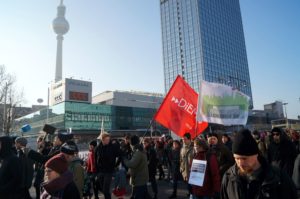
They are all present on this sunny Saturday in the heart of Berlin. United and loudly they demonstrate in front of the Rotes Rathaus, (the city hall), the Humboldt Forum, the city palace, the old city hall, the Volksbühne. “These people want their city back”, is what a participant comments. She participates for the movement “Democracy in Europe Movement”, short for DiEM. She relates that DiEM wants to connect the “rebel cities” of Europe. Her role model in this respect is Naples, the only major European city that brought its water supply back into public ownership. “This shows the need for change from below”.
Wandel von Unten, change from below, that is what the calls of the demonstrants demand among the historic buildings of Berlin.
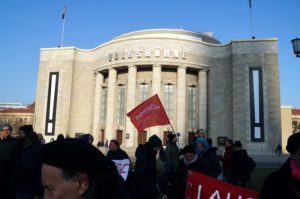
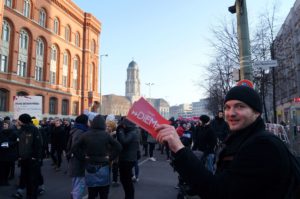

by Dominik Schlett, pictures by Reto Thumiger
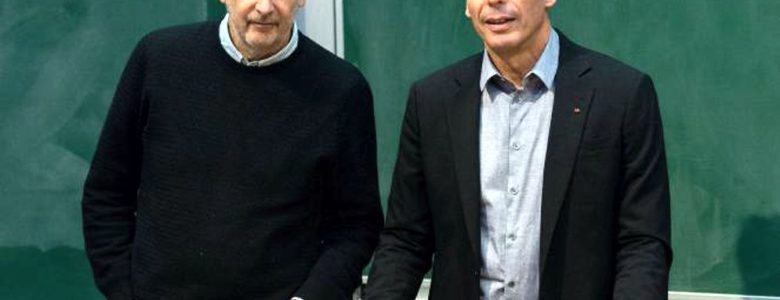
Yanis Varoufakis comes to King’s College London
Yanis Varoufakis made his way to Britain recently as part of his tours of the continent, aiming to mobilise support for DiEM25 and its Progressive Agenda for Europe. During his visit over the weekend, Yanis and some other leading DiEMers hosted an event in London at Conway Hall to assemble together Europe-minded British progressives and kick-start their mobilisation.
The previous day, on the Friday, Yanis, along with Srećko Horvat and Elif Şafak attended an event hosted by The Guardian, again to spread the message of Democracy in Europe, and to galvanise Britons, demoralised by the unfolding course of Brexit. However, a lesser known event also took place earlier that Friday, as Yanis Varoufakis came to King’s College London and spoke to a room of over 200 students and staff to discuss Europe’s Crisis, and DiEM25’s Agenda to solve it. Hosted by the KCL European Society and the Department of Political Economy, we brought Yanis to the centre of London to speak to an enthused audience of students and academics who are concerned for Europe’s future and, we hope, were open to hearing the progressive message of DiEM25.

Among the topics discussed were Brexit, the May government’s grappling with one of the most difficult issues to face Britain in decades, Trump’s America, the prospects of Corbyn’s Labour Party, the travesty of the Eurozone crisis, the failure of Europe’s leaders to arrest that crisis, and how people can get involved, convince others and win the political battles we are now being confronted with. After Yanis’ opening speech, discussions between him and members of the audience lasted for another 45 minutes as we tried to look through as many details as possible of the current political crisis our continent faces.
A key point which was discussed was DiEM25’s relevance to Britain considering the recent vote to leave the Union last June; a theme which continued over the weekend. Some of the key ideas Yanis got across on the subject were that whilst Britain can vote to leave the EU, extracting itself politically and economically is a mammoth task which cannot be accomplished without pain and a considerable amount of time. Nor is it something we progressives at least should be extracting ourselves from; Europe’s battles are our battles, and the challenges fellow Europeans face on the continent are those we face on these islands also. Refugees and migration, green energy and climate change, stagnant economies, official transparency and the ever-elusive subject of democracy are all at the centre of the political debate and will guide us as we go forward; to turn our backs to the continent would mean to turn our back on the very same battles we are fighting here, and in which we need as many allies as we can get. Ultimately Britain cannot face the challenges of the future alone, we can only do this as Europe, united.
As our assembly came to an end, our audience gave a rapturous applause. Thanks King’s College staff and students for a fantastic afternoon!
Photo Credits: Ray Tang

Warmongering in the Balkans
Warmongering has always been an instrument which is used by elites to neutralize social resistance. When people start to raise their voices against the poverty and inequality and when the elites sense that their power and privileges are under threat, they use nationalist rhetoric to redirect the anger of the oppressed people. By using cheap and flammable nationalist rhetoric they convince people that their enemy is not the domestic economic and political elite which made them poor, but the similar poor and hungry people of other countries. Even though elites cause wars, they are not the ones who take up the guns and go onto the battlefields. Instead, it’s the ordinary people who fight against each other. As famous Serbian socialist, DimitrijeTucovic, said over a century ago, “rich people sent their oxen to the war and poor people sent their sons”.
Even though this is a well-known phenomena in the countries of ex-Yugoslavia, it seems that the elites of those countries are trying once more to use the same tactic. Two and a half decades after the bloody breakup of Yugoslavia and restoration of capitalism in the area, these societies are falling apart. Small numbers of oligarchs collected all social wealth through predatory privatizations, domestic industry was destroyed, the public education and healthcare systems are being destroyed, unemployment and poverty are on an alarming rise, and widespread corruption and authoritarian rule are making living conditions unbearable. In this situation, people all over the region are protesting and demanding justice and equality. Mass workers protests in Bosnia in 2014, recent protests in Macedonia and mass citizens protests in Belgrade and Zagreb, are just the top of the iceberg of the people’s revolt. Elites are well aware of this and they realize that the current social-economic system and their privileges are under the threat, so they are trying to turn the oppressed people against each other. Recent tensions in the region show this very clearly. Through their dangerous statements, politicians of those countries are waking up the ghosts of the past and making the theme of war a regular part of public discourse.
First, tensions escalated in Bosnia about the referendum in the Republic of Srpska. Instead of dealing with the issues of unemployment and poverty which are enormous in all three parts of Bosnia, national leaders of Serbs, Croats and Muslims were competing over who could make a bolder war statement. This whole situation at the end was useful only for them to gain some political points and continue with their disastrous economic policies. As one Bosnian hip hop artist said in one of his songs, “you are representing three nations, but you are stealing in the team”.
After Bosnia, tensions escalated between Serbia and Croatia. Again, both governments were competing over who could make the more flammable statement, which created a very tense atmosphere in the region once again. In Serbia today, the same parties that led people into the war and suffering during the 90’s are in power. After the colored revolution in 2000, “Democrats” destroyed the domestic economy with their neoliberal policies which brought back to power the parties from the 90’s. The Serbian Progressive Party (party created from the extreme-right Serbian Radical Party of Vojislav Seselj) and “Socialist” party of Serbia (party of Slobodan Milosevic) are imposing harsh austerity measures under the dictate of the IMF which causes enormous inequality and poverty. Since their policies are facing massive resistance, they are now trying to neutralize the situation using what they are best at – cheap nationalist rhetoric. In Croatia, the situation is very similar. The Croatian democratic union, nationalist party which also ruled during the war is still in power. The exceptions were the two mandates of Social-democrats, but their policy was not much different, since they turned right, like all of the European social-democrats.
The most recent tension escalated between the Serbian government and the government in Pristina. The Serbian government sent a train from Belgrade to the Serbian part of Kosovo, on which was written “Kosovo is Serbia” in 20 different languages. Kosovo’s government sent special police units to stop the train which then Serbian prime minister, in his dramatic manner, interpreted as an act of war. Officials on both sides were releasing flammable war statements again, and the Serbian president even stated that he would go to war himself if necessary. The situation with the provisional government in Pristina is no better than the others in the region, since Kosovo today functions as a colonial protectorate of NATO forces andalso because the president of Kosovo is another well-known figure from the 90’s, Hasim Taci, who is accused of war crimes. With this kind of leadership, the people of the West Balkans have a lot of reasons to fear for their future.
Since DiEM25 is a movement in whose core is international solidarity against the reactionary forces which threaten to destroy EU, we, DiEM25 members from Serbia and Croatia, are calling for united action against these attempts of the elite to divide the people of the region. We, like the majority of people in our countries, are not buying these lame attempts and we will not tolerate the spreading of war propaganda and the creation of nationalist tensions. We are calling all of the progressive organizations, movements and individuals to raise their voice together against this madness and to join the resistance. Right-wing populists are flourishing everywhere due to the economic crisis, dividing people of different nations, religions and color and only through international solidarity we could stop them and build another, democratic Europe.
Carpe DiEM25!
DSC Beograd 1 & DSC Zagreb 1

Cover picture: youtube screenshot

DiEM25-UK: Organisational launch meeting at Conway Hall, London
by Andrew J. Brown
On Saturday morning, January 28, 2017, at Conway Hall in Central London, long an important place for radical religious, philosophical, social and political thinking in the UK, DiEM25 held its UK organisational launch.
Like all DiEM25 gatherings, more than half of the meeting was made up of conversations involving those attending. To set the scene and introduce some important initial ideas, the morning began with brief contributions from Brian Eno, Elif Şafak, Agnieszka Wiśniewska, Igor Stokfiszewski and, finally, Yanis Varoufakis.
The first speaker, the British musician and composer Brian Eno, began by noting that the venue, Conway Hall in London, was a place he knew personally because in the late 1960s he used to come here to hear avant-garde music concerts. This memory, in turn, reminded him of another time, like the present one, when everything was changing and when a great deal of radical rethinking was going on. He noted, however, that in the 1970s much of this kind of thinking was reversed by an Ayn Rand-inspired selfishness that developed into simplistic ideas of how societies should run themselves and which even begun to question, as Thatcher famously did, whether there was, in fact, any such thing as society. Eno pointed out that although the 70s were followed by a few decades of prosperity and a huge amount of wealth creation, this wealth was eventually concentrated in only the hands of a few and we simultaneously saw the stagnation of the wages of everybody else. For Eno this dangerous gulf finally became clear to everyone last year and marked the end of a forty year period of decline. Suddenly the idea of doing politics, which people of his generation often thought was “akin to masturbating in public and to be avoided at all costs”, was something once again worth engaging in.
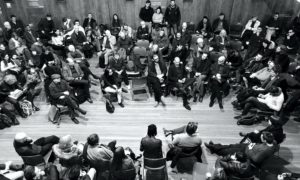
Eno, a key figure in the development of electronic music, was also keen to note an important phenomenon concerning the interrelation of technology and democracy. He told the meeting that many of his high-tech friends in places like Silicone Valley had carefully avoided politics for a very long time because they expected that technology would “be the de facto solution to our problems”; for them politics unnecessarily “complicated the plot.” But recent events had helped us all understand that merely going along with “the drift of things” is not enough because “the technologies won’t make the choices for us, they need our guidance and our input as well.” The need to make conscious political choices was memorably summed up by Eno when he said that after the election of a serial liar in the form of Trump and, in England, of [Boris] Johnson, people had finally begun “to realise that that the laissez-faire doesn’t work — while we’re laissez-ing they’re still faire-ing — so suddenly we’re starting to think that politics might be worth doing again.” Ultimately, Eno felt that this was what DiEM25 is about: it is a movement to revive and reinvigorate this thinking that we must make choices.
The next speaker was Elif Şafak, the Turkish author, columnist and academic who brought to the meeting an important set of perspectives from the current Turkish context. She began by noting that if you come from a country where democracy is obviously and openly being seriously challenged “you simply did not have the luxury of being apolitical.” But, she reminded us, one of the important, wonderful things we could learn from feminism is a recognition that politics is not only about what goes on in parties and parliaments but also about “what goes on in our private spaces, in our bedrooms, in our kitchens, in our daily lives; politics is where ever there is power.” Şafak felt that the important thing to see here was that when approached in this broader sense it was, in fact, now impossible truly to be apolitical.
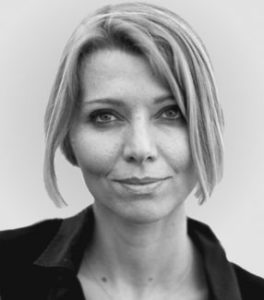
Elif Şafak, DiEM25 Coordinating Collective member
Şafak then raised a question about “popularism” and noted that one of its strategies is to undermine knowledge by speaking to gut feelings. This requires us to do two things. The first is to acknowledge that those on the liberal, left and progressive end of the political spectrum have not been at all good at connecting with people’s emotions . She reminded the meeting of the need to allow people to talk about their anxieties, angsts and angers, since this is “an age of anxiety.” The question is how do we create a language for those people (not in the room), who have been attracted by the kinds of “popularism” which have so successfully already picked up on these emotions? For Şafak, to address this properly it is vitally important that we develop our own emotional intelligence and find ways to make it possible for people to talk about immigrants, refugees, about losing one’s identity and culture but in a way that channels those feelings into better, more democratic and inclusive ways of being together. The second thing that the rise of popularism requires us to do is never to forget the vital importance of knowledge and facts but always to ensure that they are spoken about with emotional intelligence. A key overall point from Şafak was that writers have an important role to play because they are in positions to bring about this mix by adding good story telling to facts and knowledge.
The next two speakers were Agnieszka Wiśniewska and Igor Stokfiszewski from Krytyka Polityczna (krytykapolityczna.pl) and DiEM25’s Co-ordinating Committee.
Wiśniewska saw her work as chief editor of a political magazine as a matchmaker between grass roots movements, activists and academics so that, together, they can begin to fight for progressive change and real democracy. She told the meeting that her passion for DiEM25 was because it provides an ideal context to meet people from different backgrounds and skills but who still share the same ambitions.

Agnieszka Wiśniewska
Wiśniewska concluded that soon Poland will be a major battleground for progress and liberty and she expressed a hope that they will be able to learn what do in order to “reverse the course of authoritarianism that Poland is currently taking.”
The first part of the meeting was then concluded by some remarks by Yanis Varoufakis.
Varoufakis reminded us that, in 2016, passion came back to politics, but in the wrong way for it was now fuelling not progressive polices but regressive ones. He rehearsed DiEM25’s “radical remain” position of being “in the EU against the EU” but reminded the meeting that we failed to convey to those sympathetic to DIEM25’s position of “constructive disobedience” that we could, in fact, change anything; our inability as a progressive movement to impress upon people that we could win government was why we lost the referendum.
Key to understanding the current situation is the need to see that the clash between the so-called “liberal establishment and the popularist xenophobic insurgency” is not what it seems. He admitted that to some extent can be seen as a clash but, in truth, it is more accurate to see the two blocs as accomplices, to realise that they need and empower each other as much as, in France, Marine Le Pen helps empower François Fillon and vice versa. This fake opposition is, Varoufakis notes, “the cause of great suffering” and the only the genuine opposition or antidote to this is a group like DiEM25 — a progressive internationalist movement.
But, as Varoufakis observed, it is vitally important to realise that we are very far away from being efficient, we need to be honest and “look ourselves in the mirror as progressives and realise that we are dismal failures. The Labour Party, the Scottish National Party, the Green Party, Independent Progressives, are all in disarray. Corbynite Labour is too scared to talk to Caroline Lucas of the Green Party in case the Blairites attack them even more harshly. Nobody talks to the SNP in case Scottish Labour gets upset and the net result is that the Tories have complete and utter dominance of the political scene. This is why DiEM is here.”
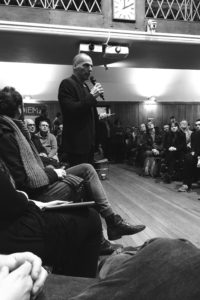
Yanis Varoufakis
“At the moment, we have this image of being a nice collection of people who have interesting things to say about Europe. But who cares about Europe we’re now out of Europe and we have serious problems now to consider in this country!? So DiEM is irrelevant. And they are right! And they are also right to think that we’re useless and irrelevant as long as we fail to convince them that we have something pertinent to say about daily life in this country. And [this is also true] as long as we fail to project the essential respect that we must have for people’s emotions, as Elif said, for the genuine spirit of discontent amongst those who voted for Brexit. Now DiEM came out of resistance, throughout Europe, to the scapegoating of the weakest citizens for the failures of the establishment. I think that it is essential to understand that the majority of those who voted for Brexit are our people. If we don’t see that, we might as well just go home and watch television. It is essential that poor whites in Leeds, in Wales, in the suburbs of London, in the inner city, get a feeling from us that we understand their plight and that we respect their concerns, their worries, their fears, their angst, just as much as we do that of the Polish immigrants, of LGBT people, of the minorities, of the Greeks, the Turks and so on and so forth. If we fail to do that in a British context we’re irrelevant. We’re just another irrelevance that speaks good prose.
Remember what we’re trying to do today. We’re going to transform DiEM25 into a British organisation. Maybe we should have a different name for it — to signify that it is now addressing British concerns and it is putting forward proposals for dealing with the real sources of discontent. And there are two of them:
Involuntary under-employment, which is the bitter fruit of austerity and involuntary immigration, which is the bitter price we have to pay for an economic model which concentrates all decent jobs in very small areas forcing people from the north of this country to migrate to London, from Poland and Bulgaria to migrate to Britain, to Germany or to France.
If we don’t manage to put forward, as a British organisation, a proposal for a New Deal for the United Kingdom and then, once we do that, to explain and to convince the people in the north of England in particular, that this must go hand in hand with a New Deal for Europe, we will have failed. Thank you.”
Srećko Horvat then opened the meeting to the floor and the following questions and points were raised. In what follows, the individual points of the discussion are summarized in short paragraphs.
Responses from the panel:
Elif Şafak noted that Turkey experienced how politics could all too easily divide family and friends and the biggest mistake would be to go back to identity politics. Dualities are unhelpful and we repeat them at our peril because the only the popularists will benefit from such a politics. She added that we shouldn’t leave patriotism to the nationalists or faith to the religious. In the end this is all about solidarity; it’s about the knowledge that history can go backwards and that it’s OK to love one’s country but only insofar as we always remember we are more than that. She also emphasised that popularists have a big problem with pluralism. Therefore, it is important to emphasise multiplicity and to refrain from binary oppositions and polarisations etc., to remember we live in a liquid world and need to reach out to people outside our own echo chambers.
Şafak responded to the earlier question about the role of literature from the floor and noted that this is a question which has been asked throughout history. Her feeling was that we must continue to write our poetry etc. and that it’s not just a luxury to continue to write. Popularists aim to dehumanise the other but, she reminded us, story tellers can re-humanise the other and combat this. As such, engaging in literature is a vitally important thing to be doing.
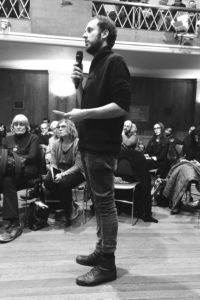
Srećko Horvat, DiEM25 Coordinating Collective member
Eno also thought it was important to address precarity in general and for us to move beyond the idea that human beings are merely units to be plugged into any job that happens to be going. He thought we were being turned into third-world sweat shop workers (or at least he felt that this was what working people feel) — people no longer respected as humans. His hope was that in DiEM25 we could begin to build a future that is hopeful and that revolves around the idea that we could make something, not just as good as the old days, but something better than has existed before.
Yanis Varoufakis concluded by picking up on this point of Eno’s that for hope to flourish it needs a vision of a creative population that is not kept in line by fear. Indeed, he thought that this should also be our vision. However, he was insistent that none of this is going to happen if we have these meetings, feel fantastic and then do nothing afterwards. Therefore, he said, it is important that this meeting produces teams of people that make it their business, not only to spread the word, but to create a narrative that speaks to people’s needs out there and which doesn’t just speak to great universal principles. For Varoufakis the three basic needs to which we must speak are as follows:
1) The need for job creation — without investment he noted there is no job creation. Investment in physical, wealth producing stuff (machines and people) is the lowest in Britain today since 1945.
2) The need for basic social housing to reverse the Thatcherite malaise of council house sales. There has to be a programme to restore to people the ability to live in a decent home in their own communities without the need to leave to live and work elsewhere. he observed that if we don’t do this all our emotional intelligence and poetry will be wasted.
3) The need for a Universal Basic Dividend. Varoufakis pointed out that one of the greatest fallacies of capitalism and of free market ideology is that wealth is created individually and then appropriated through the tax system by the state. The reality is, he noted, exactly the opposite — wealth is created collectively and then privatised. Since capital is produced socially it should be enjoyed socially. In the light of this Varoufakis told the meeting that DiEM25 has been developing a policy, not of a Universal Basic Income, but of a Universal Basic Dividend. This would not be funded by taxation but through a Trust Fund into which a percentage of the shares of every corporation is to go, where the dividends amass, and which are then distributed to all as a Universal Basic Dividend. In Varoufakis’ opinion this is the only way to share the returns of automation across society.
Varoufakis was concerned to point out that these ideas were just some of that need to be taken out into the real world where real people discuss their real needs. What’s needed, in his mind, is a New Deal. He asked the meeting to remember that Roosevelt’s New Deal was designed to address fear and the fear of fear. Consequently, he felt we must come out of this meeting with a determination to get together to put forward very realistic, moderate proposals for what can be done tomorrow to fund a Universal Basic Dividend, social housing and a jobs programme.
Varoufakis offered this as a small example of what could be done now. He reminded us that the Bank of England has been printing money now for many years in order to refloat the financial sector, buying, in other words the debt of the financiers. Now, if instead of that, he asked us to imagine what would happen if we had a Public Investment Bank, like the Post Office used to have (the Post Office Savings Bank) issuing bonds? The Bank of England could buy them and then that money could go directly into research and development into, for example, green energy. This he said was one simple practical proposal that could be part of a New Deal for Britain which could address the syndrome of TINA (There Is No Alternative). He pointed out that we don’t need a socialist revolution before we can offer an alternative, in fact, the Bank of England could do it almost immediately in conjunction with a Public Investment Bank that could be created within six months. So, he asked, “Why are we not doing it?” In his mind the rage of people must be directed at the question of “why are we not doing that which we could do today within the capitalism we have? Not to create socialism but in order to stabilise the society we have and address basic human needs.”
Varoufakis felt that if the discussion is about what can be done in Britain today — forget Brexit, forget what we want the European Union to be — in order to address these basic needs then he trusts that it will be very, very simple to bring Europe back into the conversation. Because, when you start thinking about the three basic needs in Britain suddenly it becomes automatic to link this to the importance of a similar deal for France, for Germany and for Europe. It becomes clear — as the Greens realise in connection with climate change — that you cannot properly deal with important matters on your own; there has to be an alliance between all these countries implementing similar policies.
Varoukais said that the proposal he is putting on the table of this meeting is for a New Deal for the UK based on four or five areas where we can develop simple, moderate common-sense policies that will appeal to all people, without any mention of Brexit, the EU, Europe or even DiEM25. He felt that once we start such a conversation then we will create the political infrastructure for people from Labour, for people who are progressive Conservatives, for people from the Greens, for independents who are disillusioned, for those who are not currently politically involved. His hope is that when we are no longer just in Conway Hall but everywhere, then the discussion about Europe will return in a civilised way which allows people to avoid the false binary opposition that exists between official remain and Brexit.
Varoufakis began to conclude with a point about popularism. He did not believe it was possible to be both a democrat and a popularist; democratic popularism is for him a contradiction in terms. In his definition “popularism is the tactic of promising all things to all people without meaning any of them in order to usurp popular consent and then turn it against the people.” Varoukakis emphasised that this was why he was a democrat and insisted that we in DiEM25 should be in the business of putting the demos back into democracy. He acknowledged that to do this we needed to become popular but not at the expense of embracing popularism. He added that the UK manifesto must, therefore, include very simple ideas about how to put the demos back into British democracy.
Lastly, he reminded the meeting that Burkean Tories talk about restoring sovereignty to the British Parliamentary system and he thought “we needed to adopt that, to steal it from them because it’s a fantastic idea. But they will not do it, only we can do it because they don’t want to do it. They are really popularists, using the language of democracy in order to deny it to anyone except themselves. They want democracy for the rich, for those who are in surplus, and deny democracy to those they considered discarded, morally defective and therefore poor. It is essential that we restore that and we introduce constitutional proposals in the UK Manifesto of DiEM.”
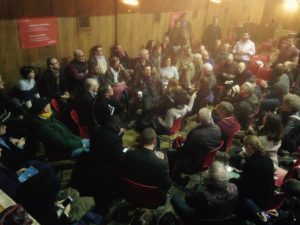
The meeting then broke up into four small working groups with the following themes:
- The drafting of the UK Manifesto and to consider a name for DiEM25 in the UK.
- Media/Communications
- Barebones organisation including fundraising
- DiEM25 Voice — the artistic core.
Reports of progress from these groups will be forthcoming in the coming weeks.
Yanis Varoufakis began to draw the meeting to a close by announcing that there were to be two more groups which people could join and sign-up to at the close of the meeting. The first was one to discuss a UK economic policy that would parallel the Green New Deal for Europe which will be formally launched in Rome on 25th March (the sixtieth anniversary of the EU).
The second group was one which would focus on the alliance building that DiEM25 in the UK needs to develop.
Varoufakis finished by making it clear to the meeting that
“DiEM25 wants to be as inclusive and anti-sectarian as possible. The intention is not to create a party that goes against Labour, the Greens, the SNP. Rather the objective is to become the movement that energises them at long last to get their act together. So we need alliances, with Labour with the SNP, with progressive Conservatives, with anyone with sense and sensibility who is willing to participate in the attempt to create a progressive international insurgency against the insurgency of the neoliberals and against the insurgency of UKIP.”
The meeting concluded with a few further points from the floor.
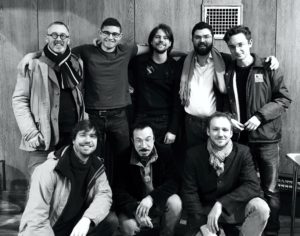
The movement’s Volunteers Coordinator, Judith Meyer, reminded people that they could be in touch with DiEM25 by emailing [email protected]
A question was asked about the Labour Party’s decision to force MPs to vote for the triggering of article 50. Varoufakis replied by outlining the current DiEM25 position that was recently decided by referendum within DiEM25’s membership. This can be found on the DiEM25 website.
The final comment came from a woman who came to the meeting with her daughter because both her children had felt so hopeless about their future after the Brexit vote. She wanted to thank the meeting for giving her, and her daughter, things to do and hope for the future.
There can have been no one present who didn’t agree with Yanis Varoufakis when he said he could think of no better way to end this meeting.

Yanis Varoufakis: Europeans should be excited about Benoît Hamon winning the French presidency
By Yanis Varoufakis
A few years ago, in a televised chat with other French progressives, Benoît Hamon succinctly exposed the essence of our troubles in Europe: “[EU] governments may change,” he said, “but not the policies”.
Since then, the Socialist former Education minister has been developing policy proposals to help steer both the EU’s second-largest economy and the European project away from its current destructive socioeconomic spiral.
From his calls for universal income and proposals for humanitarian visas for refugees to his ideas on how to make France’s parliament more representative, Benoît’s candidacy embodies the progressive, democratic values we hold at DiEM25. Like an increasing number of European progressives, Benoît embraced DiEM25’s concept of “Constructive Disobedience” as the vehicle to trigger positive change in Paris and Brussels. We should all be excited about the prospect of Benoît occupying the Élysée Palace.
A few weeks ago, I had an open and frank dialogue with Benoît in Paris. As DiEM25 we’d like to continue exploring some of his progressive proposals in more detail (for example, I think that Benoît’s universal income plan could benefit from DiEM25’s own universal right to capital income proposal). But I was delighted with our conversation and Benoît’s willingness to join forces and becoming a leading part of our effort to build the Progressive International that will save the EU from itself.
The media often refers to Benoît’s admiration for Muhammad Ali – he has a poster of the legendary boxer and activist in his office. And I find this quite fitting in terms of the current political landscape and the commentary around Benoît’s chance to become France’s next president.
Bon courage, Benoît! As Ali said,
“Impossible is not a fact. It’s an opinion. Impossible is not a declaration. It’s a dare. Impossible is potential. Impossible is temporary. Impossible is nothing.”
Photo: Libération
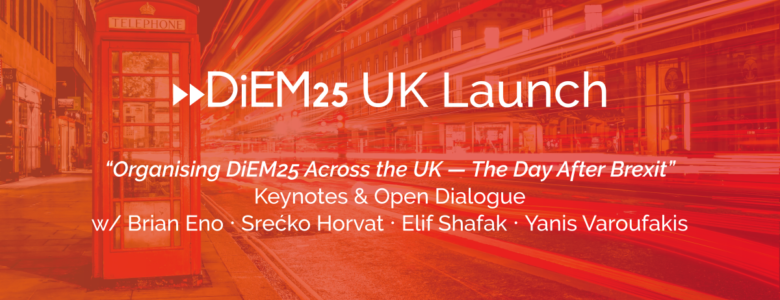
Britain needs DiEM25; and DiEM25 needs Britain
By Sam Hufton (DiEM25 UK member)
There is much talk about Europe today, though not in the way that many of us Europe-minded Britons would have hoped this time last year, as we inched towards the referendum on membership of the European Union. Today, we talk of when to trigger Article 50, what kind of (trading) relationship we want with the continent after we exit, whether continental governments are friendly and will treat us nicely, and whether Europe is even relevant, given that we are soon to become, in Prime Minister May’s words, “a global Britain”. Much of this is necessary in light of the way Britain voted in June last year. However, it is far from exhausting the conversation and thought on the subject of Europe in a British context. We may have voted to leave, but Europe is not now just the opposing side of a negotiation.
There are some of us who realise that, try as we might, Britain cannot escape the perils and trials of the continent, as it crashes down the highway of history. Looking at our past, we see a story in which we are intertwined with Europe since antiquity, when Caesar first gazed across the English Channel from Gaul upon this island, then renowned for its mystery. Britain was then populated by Celts, a group of tribes which had spread across large swathes of Europe. Since then, much has changed, and yet the history of the British Isles has followed that of the continent. Britons have conquered and have been conquered. Battles have been fought, thrones have been usurped, and cultures have intermingled. And yet, it is not just these ties which have led me and others to conclude that we cannot simply leave the continent by voting to do so, and then no longer pay any mind to it. As Yanis Varoufakis has often said, the situation in Europe can be best described by the last lines of Hotel California: ‘you can check out any time you like, but you can never leave’.
Ever since 1973, Britain’s politics have been deeply embedded in those of Europe. I would not say that we were ever part of the European mainstream, but we helped build the Europe of today the same as every other nation in Europe. Britain was a driving force behind the Single Market; we were involved in the debates on Maastricht and Lisbon. Most importantly, our politicians colluded in the grand scheme of depoliticising power and perpetuating what academics and other commentators refer to as ‘the permissive consensus’. This is the worst kind you can hope for as a democrat, for it is one where there is no debate, no discussion and no real public engagement or involvement in the matter itself, as if there are no politics surrounding it. This has allowed the European Union to be constructed in a way which crushes the life from democracy. It is not only a matter of bureaucrats with executive power, or how the institutions have a counter-intuitive allocation of roles; it is systemic. Britain helped build this, and now it is coming back to haunt us. Europe’s economy is failing and has persistently been doing so since 2010. Savings are enormously high whilst investment is ridiculously low, living standards are still stagnant and economic power is haemorrhaging all the time from the public sphere to the private one, and with it control of our own lives. This is true in the case of Britain as much as continental Europe. If Europe’s economy falls into another hole, Britain will be dragged in with it.
It is not just this though. All of the problems which plague Europe and which DiEM25 is hoping to combat are problems progressives are also battling against here. The democratic deficit is not just a sickness which afflicts European institutions; it also affects national ones, particularly those in Britain which are ancient and designed for an aristocratic mode of government and which have long required an overhaul. Governments are every day trying to hide more of their activities from their citizens. Europe’s response to the flood of refugees coming from across the Mediterranean has been appalling, and reflects the crumbling state of our societies – Britain’s border wall and the Jungle Camp at Calais being prime examples of this. The Green technology revolution could not come sooner, and yet investment in this sector is abysmal. And finally, the Nationalist International is rising all across the continent; it has already won its first victory here in Britain, and it will only increase its grip on our politics if we allow it. Progressives are divided across a hundred different lines and strategies, and our division leads only to the abdication of our responsibility for challenging the nonsense narratives coming from the far-right and the extreme centre. DiEM25 aims to act as the catalyst for the construction of a broad left coalition able to challenge the rising nationalism in Europe and confront their domination of the media and political landscape – something sorely needed here in Britain.
Britain is sick. It has lost its sense of place in the world, without knowing quite where it is supposed to be now and where it should or even could go. This can be seen from the state of affairs between this country and the continent. For years, Britain was deeply involved in ensuring a balance of power in Europe, and in so doing maintaining its own economic hegemony over the continent. Monnet described this situation as Britain dominating Europe from the outside. This it did for reasons of national interest; and, through a complex web of shifting alliances, Britain always managed to counter-balance aggressive powers and would-be hegemons, and so prevent Europe from unifying against it. On the other hand, whilst preserving the diversity of the continent in the age of nationalism, this also meant that Britain was deeply concerned with and involved in the politics of Europe. After the Second World War however, this all changed. (Western) Europe, jointly, decided to unify of its own accord, without any belligerent power aiming to subjugate the others. Britain has been thrown off guard ever since, to the point that once ‘Perfidious Albion’ is now utterly isolated in Europe. And it believes it has won.
Europe is and always will be “where the weather comes from”, to quote Winston Churchill prior to the First World War. We will never escape Europe, and we will never stop feeling the effects of its turbulence. Nor will we fail to keep giving to Europe. The relationship between these islands and the mainland has always been a dialogue. Today, we can aim to give back to Europe again; first, by affirming as a people our continued interest in and concern for the continent’s politics, closely mirroring our own, and second, by acting as the vanguard of a movement aiming to change the face of Europe. DiEM25 wants to completely upend the establishment’s mismanagement of the Union. It wants to throw out the old rulebook of austerity, fortress Europe, blindness to the future and depoliticising European politics. These battles need to happen in Britain too, and if we are successful here, perhaps we can export our victories with authority and confidence to the continent. We start with a conference, a rally, a meeting – to be less dramatic – on 28th January, from 10am at Conway Hall. Varoufakis will be there, as will Brian Eno, Srećko Horvat and Elif Şafak, among others. But they are less important than the native Britons who show up; the Britons who recognise their politics needs a dose of radicalism, want to make that difference, and care about what happens on our entire continent. Those people should come to DiEM25 UK’s inaugural meeting, to begin the transformation of Europe from the ground up.
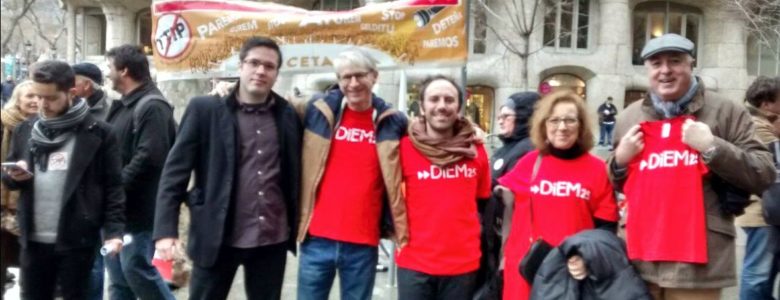
Setting the tone for DiEM25's grassroots activism in Barcelona
It’s a rainy, late-January morning. A group of demonstrators stands singing in front of the Barcelona European Parliament Office to protest for the European Action Day against CETA. Among these demonstrators can be found progressives, ecologists, feminists, alter-economists and, as has become usual in this city, DiEM25 supporters. Even in a cold winter morning, the red tees glow with hope.
Barcelona’s DiEM team introduce themselves:
In a matter of a few months, DiEM25’s Barcelona1 DSC has become a well-known actor on Barcelona’s political stage. DiEM25’s dedicated volunteers are to be found at all kinds of demonstrations and events, particularly at those dealing with Pan-European issues like free trade deals and refugees.
Yet, their activism has gone way beyond street mobilization. The voices of DiEM25 are voices that everyone wants to listen to. DiEM25 members have been invited to speak at important events, like the Young Greens’ “Let’s Rethink Europe” training, where DSC coordinators Marc J. Almagro and Emma A. Igual gave a conference on the multiple crises of Europe, or the “Ecosocialist Sessions”, where Emma spoke at a roundtable about Europe with Green MEP Ernest Urtasun and European Greens’ president Mar García (among many other prominent political and academic figures).
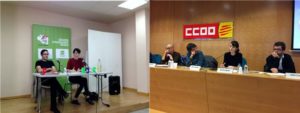
The DSC supports causes and events related to DiEM25 and that are in line with the movement’s ideals by attending events and live-covering them on social networking platforms. One of the main events covered by the DSC was the presentation of the #StopTheDeal campaign, where Yanis made a video appearance, as well as conferences by Noam Chomsky, Elif Shafak, Gerardo Pisarello and many others.
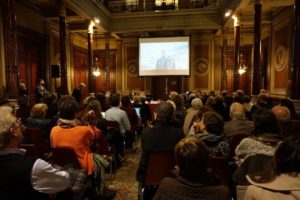
Furthermore, Barcelona DiEMers have been quite prolific when it comes to policy work, having contributed many proposals to the movement’s Progressive Agenda for Europe, dealing with innovative issues like a universal basic income and technological sovereignty.
Last but not least, beyond the political struggle, the Barcelona1 DSC works to leave a footprint on the cultural and social sphere of the city. With this aim in mind they have launched a film discussion series, starting with an event about Ken Loach’s “I, Daniel Blake”, and they are currently setting up a reading club.

Join us on Saturday to launch DiEM25 in the UK!
This Saturday, January 28, I’ll be in London with other DiEMers for the organisational launch of our movement in the UK. And we’d like you, as a DiEM25 member in the UK, to be there with us.
Brian Eno, Srećko Horvat and Elif Shafak will join me in welcoming you to a DiEM25 open meeting, which will take place from 10am to 1pm at Conway Hall in Central London.
Our goal is to trigger the process of formalising DiEM25’s presence in the UK. We need you there to help organise a grassroots force to shape our post-Brexit future, and cement a “Progressive International” to stand against the dangerous “Nationalist International” taking hold across the globe.
This is not a conference, nor an event where a group of speakers will deliver a one-way message. This is about turning into action the conversation we have been having in the UK over the past several months. This is an opportunity for you to get hands-on and voice your ideas, and work out how to take part in our movement as best you can.
Looking forward to seeing you on Saturday.
In solidarity,
Yanis Varoufakis
DiEM25 Co-founder and Coordinating Collective member
AGENDA
10-10.45 WHY DiEM25 UK?
- Welcoming speeches by members of DiEM25’s Coordinating Collective
- Purpose of the event: How to make DiEM25 operational throughout the UK
10.50-11.50 BUILDING ALLIANCES IN THE UK & BREXIT POLICY
Moderated open dialogue
12.00-13:00 ORGANISING ACROSS THE UK: ‘THE DAY AFTER’
- Short interventions by DiEM25 UK members who helped organise the event
- Amending the organisation’s name
- Commencing work on a Manifesto for a Democratic UK
- Commencing work on extending DiEM25’s economic and social agenda (the European Green New Deal) to the UK
- Building up DiEM25 UK across the UK
